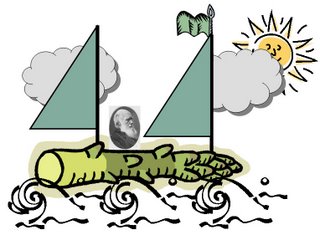Mr. Darwin and the Racing Asparagus

The subject matter for this entry was really brought to my attention by a good friend of mine and a loyal member of my small, yet prestigious, "Dennis is interested in anything about Darwin" network - THANKS Robert!
The link is to a report (listen to the report) by NPR's Robert Krulwich on an aspect of a relatively new Darwin book titled, "The Reluctant Mr. Darwin" by David Quammen (blog reading list). I just finished this read - it's great! - I always enjoy Quammen's writing (see the blog reading list above).
Anyway, It seems that Mr. Darwin became very interested in the geographical dispersion of plant and animal species. Doesn't sound like a very risky subject, right? But in the Victorian religious world it was. Mr. Darwin came to believe that plants and animals got to where they were (or where they weren't) pretty much under their own steam (so to speak) - mainly dispersion by floating across oceans - and to try an prove it he and his butler (manservant?) began soaking plant seeds in simulated seawater and then seeing if they still germinated - with interesting, sometimes stinking, slimey and amusing results - although Mr. Darwin was "drop-dead" serious about these experiments.
Speaking of experiments, the report's sidebar includes links to some interesting amateur science sites:
In the Spirit of Discovery (article sidebar)
To piece together his theories of evolution and natural selection, Darwin relied in part on the observations of amateur scientists. That is, his children, his neighbors and their children and multiple correspondents. Below, links exploring the contributions of other great amateur scientists from the past and organizations that encourage an everyman spirit of discovery:
Society for Amateur Scientists
Amateur Scientists
Backyard Astronomy
Denver Mad Scientists Club
Great Amateurs in Science
Victorian-Era Amateur Science Experiments (great, fun site!)

1 Comments:
Dennis - Delightful!
Darwin's interest in seemingly wacky means for the dispersion of plants strikes me as in total congruity to the Vistorian era.
We now honor him for his scientific insight, and keen, disciplined observation that led to work on evolution, Vitorian times are considered to be an era of repressive enveloping atmosphere that, while they might discourage the ordinary citizen from pushing their amateur dabbling, seemed to be just the encouragement Mr. Darwin needed.
Hollywood provides us with images of early English Victorian scientists as mad dabblers (early Boffins?)who were hardly constrained by the social mores of their time.
This is more interesting when we consider the lens of their late 20th century authors. Think of the Willy Wonka (Roald Dahl), Chitty Chitty Bang Bang (Ian Fleming) stories that dared stretch imaginiations within a framework of mechanical technology of that time.
Seems Mr. Darwin was blessed with a strong dabbler instinct that served him well in a world of tight social and scientific constraint.
Post a Comment
<< Home